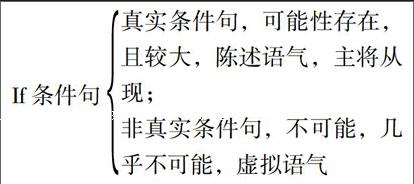用全新体系讲述虚拟语气
孙润英


摘 要:大部分高中学生觉得虚拟语气很难,不易弄懂,而虚拟语气又是高考测试的重点之一,所以笔者从多年的教学经验中分析了学生对知识的感知特点,打破传统的讲解方法,构建新的知识体系,独树一帜地完整归纳了虚拟语气的用法,利于学生学习和掌握,希望能给高中老师和学生必要的帮助。
关键词:虚拟语气;用法归纳;高考题
背景:
真实条件句,可能性存在,且较大,陈述语气,主将从现;
非真实条件句,不可能,几乎不可能,虚拟语气
If it is fine tomorrow,we will go outing.
If I were a bird,I would fly to the forest.
一、含义:特殊动词形式
(1)表说话人所说的话不是一个事实,而是一种不可能的假设,有if 。
(2)表示说话人的愿望、建议、命令、要求,无if。
二、种类
(一)有if的
在if条件从句中表与事实相反的假设
1.标准式
分三种情况(以 do 为例,见下表)。
If you had come a few minutes earlier,you would have met him.
要是你早来几分钟的话,你就能见到他了。(与过去事实相反)
If it were sunny tomorrow,I would come to see you.
明天要是天气好的话,我来看你。(与将来事实可能相反)
If I were you,I would go at once.
假如我是你的话,我会马上走。(与现在事实相反,事实上我不可能是你)
2.省略 if 的条件从句
条件:
(1)从句中有if。
(2)有 were,had 或 should 时,
可省if ,再把were,had 或 should放在句首,此时否定不能缩写。
If I were to meet him tomorrow,I should ask him about it.
Were I to meet him tomorrow,…
If he should fail in the experiment this time,he would try again.
Should he fail in the experiment…
If he had not saved me,I would have died 10 years ago.
Had he not save…不能是Hadnt he…
3.错综式
从句与主句的动作发生时间不同,此时,需要按时间或意义来确定虚拟形式。
If they had studied hard,they could do it easily now.
If he had not taken my advice,he wouldnt do it much better like this.
(二)无if的
1.用(should)+v原
(1)记住:这些动词后面接的宾语从句(10)+ (should )+ do 构成,should 可省。
四建议(suggest,advice,propose,recommend);
两命令(order,command);
四要求(demand,request,require,urge)+宾从(should )+ do 构成,should 可省。
这些词的名词suggestion / advice/ proposal/ recommendation,order/command,demand/requirement / request/urge等,后用 (should) + do。
(2)记住:
insist:坚持要求,用虚拟,即(should) + do;坚称,坚持说,用陈述语气,表示事实。
suggest:建议用虚拟形式(should)+
do ;表明、暗示,用陈述语气。
He insisted that all of us should be there on time by any means.(坚持要求)
He insisted that he was right. (坚持说)
(3)句型It is important (necessary,strange,natural) that …(should)+ do。
Its necessary that we should have a walk now.
重要的是我们要照顾好病人。
(4)句型 It is a pity/shame that …
竟然,(should) + do动原
不表竟然,用陈述
It is a pity that he should miss such a golden opportunity .
真可惜/遗憾,他竟然会失去这样一个绝好的机会。
2.相当于标准式中的if 从句
(1)wish+宾从的三种情况:
将来:用情态动词(would / could) +
do 。
现在:用过去式。
过去:用过去完成式 (had done)。
(2)would (had) rather(宁愿) +
宾从:
现在/将来时间,v谓语用一般过去时,did
过去时间,v谓用过去完成时,had done
I would rather he came tomorrow than today.
(3)as if:
从句中,真实,陈述语气;
假的,可能性极小,虚拟:
①现在相反,过去式did,be,用were
②过去相反,用过去完成式had done
She looks as if she is ill.
He looked as if he hadnt slept for two days.
三、特例
(1)Its (high/right) time that+虚拟……v谓用过去式 (或should + do,少用)。
Its time that you left here.
(2) if only要是……该多好啊, 虚拟:现在,用过去式;过去,过去完成时态。
only if 只要…… 陈述,条状从,主将从现,句首,部分倒装。
If only I had arrived in time!
Only if we help each other,can we make greater progress.
(3)一些介词短语表含蓄条件,
如:but for(要不是) =Were it not for…,without,otherwise(否则)=or,in that case(如果是那样的话),相当于标准式中的if从句,这时,句子(相当于标准式中主句)虚拟语气。
即:①would/could/should/might+v原;
②would/could/should/might have done。
Without your help,we would not have made such rapid progress.
(4)情态动词+have done 与过去有关,考试时,如为陈述,时态选一般过去时(did)。
must have done 过去肯定干了, 推测
cant have done 过去肯定没干
may have done 过去有可能干了,not sure
might have done 过去有可能干了,更加not sure
should (not) have done 过去本应该干而实际没干,含责备意思
ought (not) to have done 同上
could have done 过去本能干而没干
would have done 过去本会干而没干
neednt have done 过去本没必要干而实际干了
大体来讲,学习虚拟语气时,要从以下两点去考虑:①依据上下文意思理清句子到底表示陈述还是虚拟,然后再确定该用相应的形式。②注意依据文章开始的“含义,种类”进行判断,对号入座即可。
参考文献:
[1]章振邦.新编英语语法教程[M].上海:上海外语教育出版社,1995.
[2]商 薇.新编英语语法[M].海口:南方出版社,2002.
(作者单位:重庆铁路中学)

